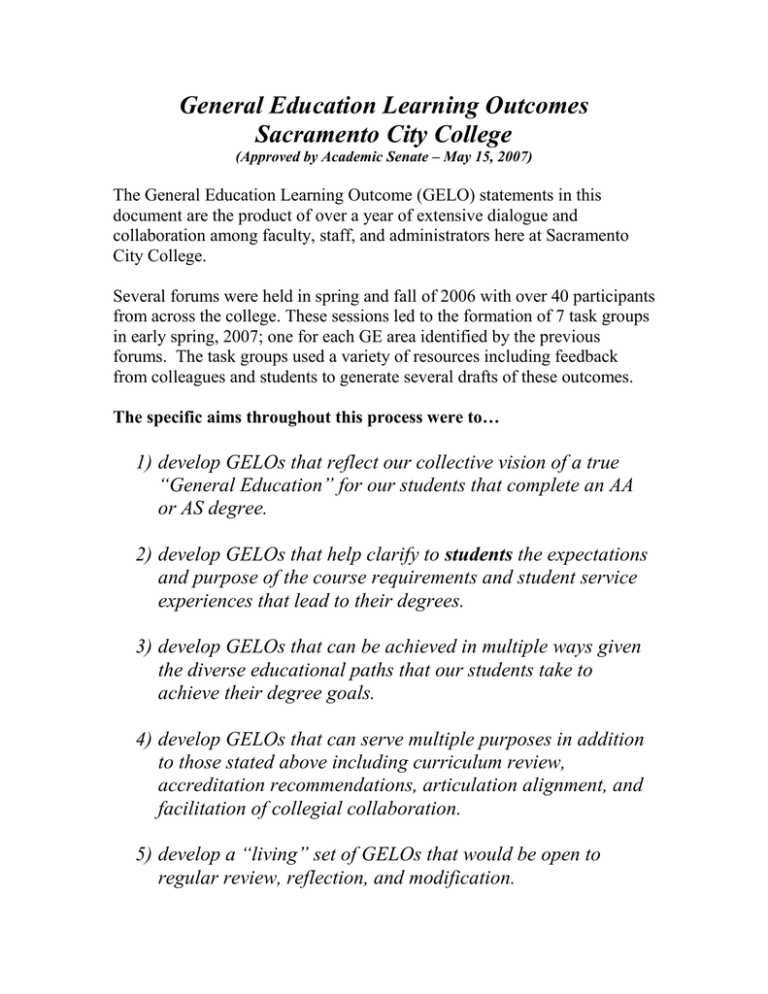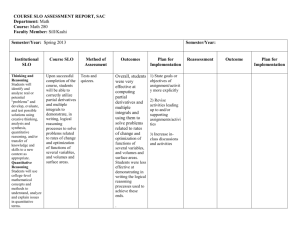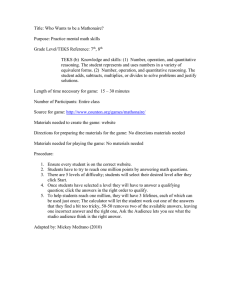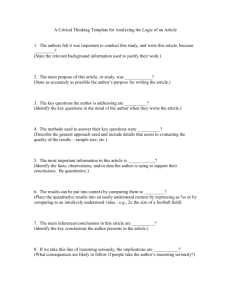General Education Learning Outcomes Sacramento City College
advertisement

General Education Learning Outcomes Sacramento City College (Approved by Academic Senate – May 15, 2007) The General Education Learning Outcome (GELO) statements in this document are the product of over a year of extensive dialogue and collaboration among faculty, staff, and administrators here at Sacramento City College. Several forums were held in spring and fall of 2006 with over 40 participants from across the college. These sessions led to the formation of 7 task groups in early spring, 2007; one for each GE area identified by the previous forums. The task groups used a variety of resources including feedback from colleagues and students to generate several drafts of these outcomes. The specific aims throughout this process were to… 1) develop GELOs that reflect our collective vision of a true “General Education” for our students that complete an AA or AS degree. 2) develop GELOs that help clarify to students the expectations and purpose of the course requirements and student service experiences that lead to their degrees. 3) develop GELOs that can be achieved in multiple ways given the diverse educational paths that our students take to achieve their degree goals. 4) develop GELOs that can serve multiple purposes in addition to those stated above including curriculum review, accreditation recommendations, articulation alignment, and facilitation of collegial collaboration. 5) develop a “living” set of GELOs that would be open to regular review, reflection, and modification. Target Population The GELO development process was focused on the expected outcomes for those students that earn either an AA or AS degree. However, a hope and anticipation was expressed throughout this process that all of our students will achieve many of these outcomes and benefits of the Sacramento City College experience. Implementation The specifics of how these GELOs will be implemented to address the specific aims stated here or any other college process are still in the developmental stage and will require guidance and support from the Academic Senate, Classified Senate, and any other group that may be involved. In any implementation, the tenets of SCC’s SLO Statement of Philosophy (see http://web.scc.losrios.edu/files/slo/ ) and participatory governance procedures should be guiding factors. Background Information and other Resources Background information on the current GELO development process, examples from other colleges, GELO task group membership, and other GELO-related activities can be found at http://web.scc.losrios.edu/slo/GELOs. I: Communication Upon completion of the AA or AS degree students will be able to… demonstrate effective reading, writing, and speaking skills. Specifically, they will be able to… fully develop a college-level written assignment, with appropriate research, using correct grammar, spelling, punctuation, and referencing style accurately interpret written and spoken expository (informative) and argumentative (persuasive) messages critically evaluate the effectiveness of their own and others' messages (written, spoken, and nonverbal) apply evidence, reasoning, and logic to create effective messages adapt messages for diverse audiences create and deliver appropriate and effective oral messages for a variety of situations, using presentation aids when appropriate comprehend and critically read material written at the college level demonstrate effective reading strategies and study skills for lifelong learning II: Quantitative Reasoning Upon completion of the AA or AS degree students will be able to… demonstrate knowledge of quantitative methods and skills in quantitative reasoning. Specifically, they will be able to… extract, organize, and analyze quantitative data from information presented in various forms. apply quantitative methods to problem solving and decision making clearly communicate quantitative reasoning processes using appropriate terminology. demonstrate an understanding of various quantitative methods, their relationship to one another and their application to multiple disciplines. demonstrate facility with numbers, including orders of magnitude, appropriate use of precision versus accuracy in measurements, approximation, and multidimensional or multivariate problems. III: Depth and Breadth of Understanding Upon completion of the AA or AS degree students will be able to… demonstrate content knowledge and fluency with the fundamental principles of the natural sciences, social sciences, and humanities. Specifically, they will be able to… demonstrate basic knowledge in at least one scientific discipline including its fundamental definitions, theories, and current research areas. demonstrate understanding of the scientific method (observation, hypothesis development, measurement, data interpretation) by evaluating or performing experiments. value the importance of the scientific method of inquiry for explaining natural phenomena and exploring the universe. interpret and apply scientific information for effective decision-making in everyday life. apply their understanding of the historical development of the U.S. Constitution as they evaluate current political issues. describe different methods of inquiry used by the social sciences and apply social science methods to the analysis of a situation or problem. analyze the operation of societies and sub-groups within societies. evaluate actions of individuals or groups as those actions are related to responses to society. describe the ways in which people historically have used artistic or cultural creations to respond to themselves and the world. apply aesthetic theory in their daily lives. recognize and apply appropriate ethical standards in approaching decisions in their daily lives. demonstrate an understanding of the ways in which cultural activities, such as languages or the arts, are expressions of complex cultural systems. IV: Cultural Competency Upon completion of the AA or AS degree students will be able to… demonstrate awareness of the various ways that culture and ethnicity shape and impact individual experience and society as a whole. Specifically, they will be able to… define ethnocentrism and cultural relativism and illustrate their impacts in personal views and behaviors. analyze race as a cultural construct and assess its societal impact. evaluate the role of culture in identity construction. explain the implications of cultural diversity in a global context. assess the ways that culture shapes the way we experience the world by examining various practices and/or beliefs through the perspectives of cultural insiders and outsiders. demonstrate respect, appreciation, and acceptance for multicultural differences. V: Information Competency Upon completion of the AA or AS degree students will be able to… demonstrate knowledge of information needs and resources and the necessary skills to use these resources effectively. Specifically, they will be able to… determine an information need in multiple contexts (academic, personal, professional or vocational). describe how information is produced, organized, and disseminated. select the information retrieval system or method appropriate to their needs, based on the content and organization of the retrieval system. construct and implement effectively-designed search strategies. demonstrate the skills necessary to use a variety of information tools to locate and retrieve information in various formats for a variety of academic, personal, professional or vocational purposes. evaluate information sources in terms of a)target audience/user, b)accuracy, credibility, and authority and c) accessibility. recognize ethical and legal issues regarding copyright as they affect authors, publishers and consumers. correctly cite information sources using different formats (MLA,APA, etc.) VI: Critical Thinking Upon completion of the AA or AS degree students will be able to… demonstrate skills in problem solving, critical reasoning and the examination of how personal ways of thinking influence these abilities. Specifically, they will be able to… logically analyze and evaluate competing claims and arguments. identify and analyze problems; creatively propose, analyze, implement, and evaluate solutions to problems. demonstrate an understanding of the way personal attitudes, values, perceptions and beliefs affect and sometimes obstruct competent reasoning. systematically examine one’s own beliefs, perceptions and ways of thinking to continuously improve reasoning skills. demonstrate an understanding of the importance of suspending judgment, on any vital issue, pending a thorough investigation. differentiate competing forms of ethical reasoning. VII: Life Skills and Personal Development Upon completion of the AA or AS degree, students will be able to… demonstrate growth and lifelong learning skills in the personal, academic, and social domains of their lives. Specifically, they will be able to… evaluate and apply data in approaching personal, community, and societal-level problems. apply principles and skills that contribute to life-long learning such as confidence in academic abilities, perseverance, discipline, questioning attitudes and interpersonal and social effectiveness. identify and effectively use programs, services, computer technology, and resources for career and academic success. develop successful study strategies in order to acquire, evaluate, generalize, and apply new information. engage in academic and vocational planning, choose and implement a plan for an academic major and career choices, and evaluate progress towards accomplishing their goals. demonstrate that they’ve created supportive social networks with family, faculty, and peers that facilitate adjustment and a sense of belonging to the college community. develop coping skills by applying psychological concepts to everyday life challenges, such as stress, substance use and addictions, interpersonal relationships, loss and grief reactions, and life changes. improve level of physical fitness and well being. critically reflect and evaluate moral and ethical responsibilities as a world citizen, building a larger consciousness and purpose beyond self. develop communication skills for successful transition and adjustment into the work world or the university. develop and utilize effective communication skills in building and maintaining interpersonal relationships.
![[Course information: prefix, number, title, credits] GENERAL EDUCATION COMPETENCY AREA:](http://s2.studylib.net/store/data/015759506_1-897e653fa9d8b4d146755dfb01d20713-300x300.png)
![[Course information: prefix, number, title, credits] GENERAL EDUCATION COMPETENCY AREA:](http://s2.studylib.net/store/data/015759505_1-7b8a217fa4bf910a83e365321689e7da-300x300.png)



